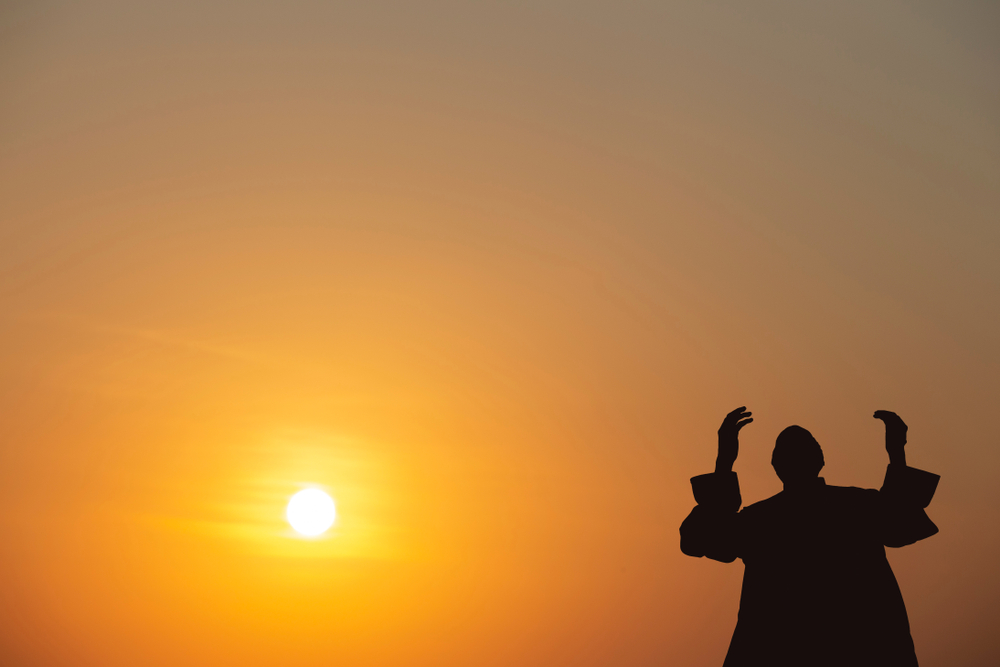By Faten Sabri

The month of Ramadan [is that] in which was revealed the Quran, a guidance for the people and clear proofs of guidance and criterion. So whoever sights [the new moon of] the month, let him fast it; and whoever is ill or on a journey – then an equal number of other days. Allah intends for you ease and does not intend for you hardship and [wants] for you to complete the period and to glorify Allah for that [to] which He has guided you; and perhaps you will be grateful. (Al-Baqarah 2:185)
Ramadan is a month of fasting and a spiritual development and it is one of the five pillars of Islam which are:
1- Declaration of faith: saying by tongue and heart that I bear witness that is no god is worthy of worship except the Creator (Allah) and that Muhammad is His last messenger.
2- Performing the ritualistic prayers to keep the connection with the Creator.
3- Giving obligatory charity to the poor people to keep economic balance in society, purify the wealth, and revive the economy.
4- Fasting the month of Ramadan to developing better self-control and appreciate God’s blessings.
5- Performing the pilgrimage to Mecca once in a lifetime to symbolize the unity of all believers regardless of their classes, backgrounds, cultures, or languages.
Ramadan is one of the most invaluable months in the Islamic calendar (lunar calendar) and it is obligatory for the Muslims to fast in this month. Muslims who are physically able to fast are expected to abstain from eating, drinking from dawn to sunset each day of the month. Fasting helps to attain piety and performing actions which please the Creator and abstaining from actions that displease Him. Ramadan is a time of spiritual reflection, improvement and increased worship and devotion.
For Muslims Ramadan is:
1- The month which was the Holy Quran revealed in, and which has the night of Decree.
Indeed, We sent the Quran down during the Night of Decree. And what can make you know what is the Night of Decree? The Night of Decree is better than a thousand months. The angels and the Spirit descend therein by permission of their Lord for every matter. Peace it is until the emergence of dawn. (Al-Qadr 97:1-5)
2- The month of Mercy, when God sends His mercy and compassion upon His servants.
Prophet Muhammad (peace be upon him) said:
When the month of Ramadan comes, the gates of mercy are opened.” (Muslim)
3- The month when The Creator Opens the Gates of Paradise and Closes the Gates of Hell fire. Prophet Muhammad said:
Prophet Muhammad said:
“When Ramadan begins, the gates of Paradise are opened and the gates of Hell are closed, and the devils are chained up.” (Muslim)
4- The month when The Creator Forgives the sins of His Servants in multitude. Prophet Muhammad said:
“Whoever fasts during Ramadan with faith and seeking his reward from Allah will have his past sins forgiven.” (Al-Bukhari and Muslim)
5- The month when The Creator answers Prayers. Prophet Muhammad said:
“The three people whose prayers are never rejected (by Allah) are:
- The fasting person until he breaks his fast.
- The Just Ruler
- The One who is Oppressed.” (Ahmad)
“O you who believe, the fasting has been enjoined upon you as it was enjoined upon those before you, so that you may be God-fearing. For days few in number. However, should any one of you be sick or on a journey, then (he should fast) a number of other days (equal to the missed ones); and those who have the strength, (still, they do not opt for fasting,) on them there is a compensation, that is, the feeding of a poor person. Then whoever does good voluntarily, that is better for him. However, that you fast is better for you, if you only knew.” (Al-Baqarah 2:183-184)
Here we can understand that fasting has been enjoined upon the nations those came before the nation of Prophet Muhammad, as we have to understand that, as long as we have the same source of existence, it is very normal to have the same teachings.
All Prophets carried the same message to all nations. A simple straightforward message as the condition of salvation: Belief in One God (the Creator), that He has no son or partner, and worship Him alone without intermediary (priest, saint, idol, prophet).
Every Prophet was the way for his followers in his time to get the salvation, and that was by following his teachings. God’s teachings as mentioned in the Quranic verse above give always the principle of empathy, striving to bring ease and remove hardship from people.
The connection between soul and body
The believers by fasting are more conscious of God, by abstaining from things that people tend to take for granted (such as water), it is believed, one may be moved to reflect on the purpose of life and grow closer to the Creator and Sustainer of all existence
As such, engaging in wrongdoing effectively undermines the fast. Many Muslims also maintain that fasting allows them to get a feeling of poverty, and this may foster feelings of empathy.
The fast is intended to bring the believers closer to God and to remind them of the suffering of the less fortunate. Muslims often donate to charities during the month and feed the hungry.
Fasting is an exercise in self-restraint. It’s seen as a physical and spiritual purification. In other words, fasting teaches how a person can resist his desires.
Ramadan is a time to disconnect from worldly pleasures and focus on one’s prayers.
==========================
About the Author:
Faten Sabri (1973-) is a modern Jordanian Muslim thinker. She is well known for her frequent interaction with various cultures, religions and she speaks different languages. She studied comparative religions which made her able to discuss the controversial issues about Islam with the truth seekers and free thinkers.She wrote books about the message of Islam, the original concept of God and Jesus Christ in Islam and she has monthly articles in an international magazines. These books and articles were translated and distributed in more than 9 languages.[opic_orginalurl]

